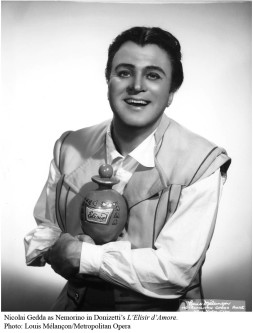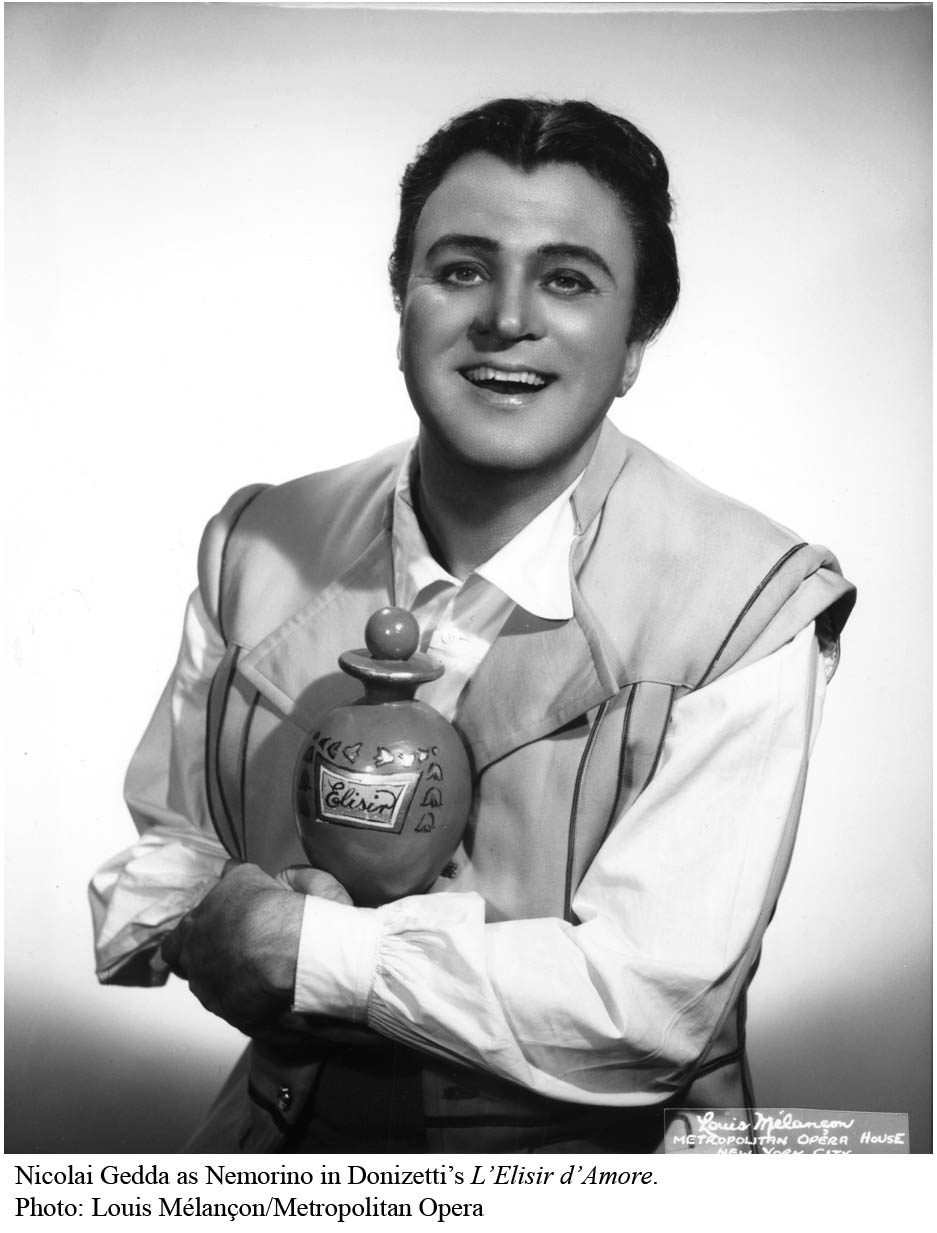NICOLAI GEDDA (1925 -2017)

His daughter, Tania, announced the death of Nicolai Gedda on January 8 at his residence near Lausanne, Switzerland. His death occurred a few months after that of his first wife, the pianist Nadia Gedda-Nova – Tania’s mother – and a few days after that of Georges Prêtre with whom he collaborated several times, notably as Don José in the recording of Carmen alongside Maria Callas.
“How to evoke the career of Nicolai Gedda without using superlatives? ” Writes Antoine Brunetto in his tenor encyclopedia, “we can begin by quoting an exceptional longevity: born in 1925, he was still singing at the dawn of the twenty-first century! One can not pass over in silence a variety of impressive repertoire … Finally, Nicolai Gedda holds a record almost unbeatable: that of the number of official recordings.”
These recordings testify today to the universal art of one of the greatest tenors of the twentieth century.
Seen and Heard International sends its condolences to Nicolai Gedda’s family.
From Göran Forsling
A legend has fallen silent. Royal Court Singer and Honorary Member of the Jussi Björling Society, Nicolai Gedda, passed away in January at age 91. For me and innumerable other music-lovers he stood out as the emblem of all the best characteristics one associates with the supreme art of singing: style, nuance, beauty of tone, elegance, linguistic diversity and versatility. His musical achievement encompassed the latter half of the 20th century, and even more than that, from his astonishing debut at Stockholm Opera in April 1952 as Chapelou in Le Postillon de Lonjumeau to several opera recordings made as late as in 2003, when he was approaching the age of 80. Few singers have enlivened the record catalogues with such richness of repertoire as Nicolai. There was opera, naturally, where he was unsurpassed in the French repertoire, but also operetta, sacred works, art songs in French, German, English, Italian, Russian, Swedish, Danish and Norwegian, folk songs and much more. After his successful debut, he rapidly became a sought-after name at all the big opera houses worldwide, but regularly returned to Sweden as a guest at the Royal Opera and also gave concerts in the provinces.
I never met Gedda personally but had the privilege of speaking to him on the telephone a number of times. There he stood out as an amiable and considerate person, always utterly eloquent. He was the kind of man who had a twinkle in his eye. I still remember the unhappy premiere of Gustaf Wasa at the Stockholm Opera, when opera director Eskil Hemberg stepped in front of the curtain just before the performance was to begin and announced that Royal Court Singer Gedda was indisposed and sent word that he was going to sing with only one ‘gill’ (‘gedda’ is the Swedish word for ‘pike’). The following spring, in 1992, he celebrated the 40th anniversary of his debut with a concert with the Royal Orchestra. He was to turn 67 a month later, but sang all his favourite arias with a ring, a beauty and an elegance that any tenor half his age would have envied. Standing ovations of course. Nicolai called for silence and made a long emotional speech to thank the audience – who remained standing.
Now he has fallen silent but the memories remain, as do all of his wonderful recordings, which I will return to time and again for the ultimate delight they offer.
An extract from Ian Lace’s 2000 review of Nicolai Gedda’s book My Life and Art which is still available – ‘Some of the most interesting chapters in the book are those dealing with Gedda’s impressions of his fellow artists. He did not get on at all well with Herbert Von Karajan. Because of his shyness, acting did not come naturally to Gedda and he had to work hard at the craft, on one occasion early in his career, he remembers, “Karajan made sure to point out my weaknesses in full public view. When he saw my miserable acting on the stage he was there quick as a flash with his bullying tactics. He did it in as hurtful a way as possible” Later, still talking about Karajan, Gedda remarks, “…our personal chemistry was utterly incompatible. If I did not go along with everything he suggested he became intensely angry. Karajan was never an easy person to deal with. He was extraordinarily egocentric. He always saw himself as the great star, beside whom there were no others. With Karajan you were there because you contributed to making his concerts and operas better. Karajan never saw the singers as living individuals but only as cogs in the machinery of his own music-making. He never passed an opportunity to humiliate a singer or a member of the orchestra. Later in life I came to the conclusion that Karajan was not a good conductor. What I learned from him was musical flow and style, but it was so tiresome to live with the stringency that he demanded at all times…He was cold, impersonal, power hungry and unpleasant.”
Gedda also thought Boris Christoff was “a difficult and pretentious man” while Victoria de los Angeles was “a gentle, quiet, angel, happy and kind-hearted.” Dimitri Mitropoulos “gave the impression of being a deeply religious man and lived like a monk.” Of Tito Schipa, Gedda reflects, “Schipa was an Italian tenor, a contemporary of Gigli, and although Gigli had a much more beautiful voice, the way Schipa handled his voice was astonishing. He also sang with exquisite taste and style, and later in life I came to think even more highly of Schipa than Gigli.” Mirella Freni he recalls as “a young and absolutely delightful performer and Gedda remembers that “…when I saw Maria Callas [singing in La traviata at the Met] I was so deeply affected by the intensity of her performance that I sobbed.” ‘
For Ian Lace’s full book review click here.
For more about Nicola Gedda visit his wikipedia pages.

Back in the nineteen-nineties Nicola Gedda gave a recital with piano at Rome’s Teatro Ghione. Most of us had assumed he had retired. He sang with perfect diction in French, Russian, Norwegian, English and Italian (including some operatic arias). What was simply amazing was the security and richness of the voice; as fresh as it had always been. Even he looked surprised at what his voice was still giving! When I talked to him after the concert with the happy realisation that his technique was as solid as ever, I said, “Mr Gedda, you will sing for ever”. He smiled, “Well maybe not for ever” he said. When I inquired how he had obtained this technique he spoke of the teaching of a Russian woman (sorry, forgotten the name) in New York “She set me and George London on the right path” he added.
A wonderful memory Jack and thank you for sharing it. My highlight was hearing him sing Nemorino at Covent Garden in 1981 and – if my memory serves me right – he encored ‘Una furtiva lagrima’.
The encore would have been typical of him, Jim: generosity poured out of the man, whether in performance or conversation, he gave you himself. I think there were four encores at the Ghione recital. How that contrasts with Maria Callas, with whom he frequently sang. I never heard Callas live but while she was making the film of ‘Medea’ with Pier Paolo Pasolini, he invited me to lunch with her, where she had a nasty little lap dog she called Gedda. Pier Paolo warned me not to laugh. But of course I did. And he knew I would. The diva was unexpectedly friendly and polite. But then, she was of a mind with Pier Paolo. So was the rest of the world except for the few fanatics that later murdered him.
The Russian lady with whom both Nicolai and George London studied, was Paola Novikova. He worked with her until her death, and mentioned her quite often. I have been a lifelong admirer of Gedda’s, since the first time I heard him sing, when I was about 15. When I attended the Juilliard School in New York, I was able to see him perform quite often, and we became friends. I still believe he is the finest tenor of the 20th century. He was not only a superlative musician, but also a kind, modest man. And humble. His facility with several languages was not hyperbole. His dressing room, after a performance, sometimes sounded like the Tower of Babel, as he spoke with fans in several languages at the same time. I would be hard pressed to pick a favorite opera which I heard Gedda perform, but there will never be another Lenski like his. However, I have no problem picking the most beautiful piece I ever heard Gedda (or anyone, for that matter) sing. It is ‘Magische Toene’, from Goldmark’s ‘Die Koenigen von Saba’. I told him that, on several occasions. If you’ve never heard it, please look it up, and listen. A reviewer of his German Arias, once stated that ‘if Angels could sing, this is what they would sound like.’ My heart broke, when I heard the news of his passing.
Many thanks indeed Ms Calachman for sharing this with us and joining in our eulogy of one of the last century’s most accomplished tenors. And as you rightly add, one of the world’s finest human beings. And this quality too shone through his singing.
Gedda was outstanding in his Russian recordings. He was very good in operetta; especially after he restudied his voice. Still he didn’t have the grace and charm of Richard Tauber and he lacked the Austrian’s refined phrasing which resulted in unforgettable recordings. Compared to Tauber Gedda’s recordings were always too straight forward with less musical fantasy. In French Gedda sounded good too unless one heard Alain Vanzo in his sixties’ recordings for Vega. Vanzo had the more beautiful voice, the better pronunciation, the more authentic style but he still sang all his Italian roles in French, had no international reputation and therefore got less recordings. For me Gedda spoiled all recordings of Italian operas in which he performed. He sounded effeminate, artificial, lacked Italian fire and ultimate beauty of an outstanding individual timbre. Record dealers always told me Italian opera recordings sold well thanks to Freni but despite Gedda (he came in at the last moment in ‘L’elisir’ because Bergonzi for a time refused to work with Molinari). I heard him in recital in Gent in the early seventies. The voice sounded exactly as on records: not big but very well projected; good style, splendid top notes though without the ring of Björling or Corelli. At the end of the nineties he gave a recital in De Munt in Brussels. There was still an amazing amout of voice left but in a few operatic arias he clearly transposed everything. My choices in his output would be: Russian arias (wonderful), Gedda sings Robert Stolz where for once he rivals with Tauber and his magnificent recording of ‘Der Graf von Luxemburg'(with Lucia Popp at her very best).